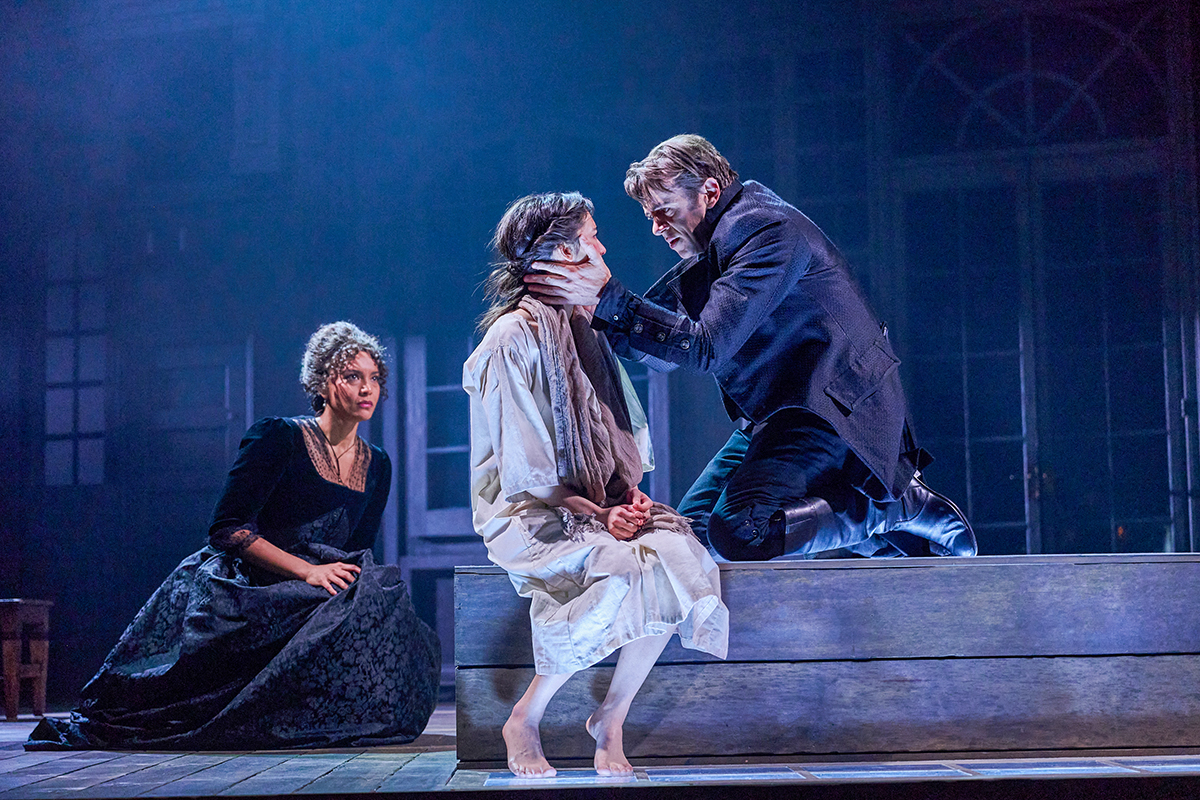Review: Heather Raffo’s “Noura” at Shakespeare Theatre
Heather Raffo's "Noura" has a wealth of ideas, but suffers from too much telling and not enough showing

A glimpse into the psyche of a woman caught between two identities — that of Iraqi refugee and successful American immigrant — Heather Raffo’s Noura (★★) is a heartfelt, emphatic play. But while Raffo works hard to give context to her main character’s angst, there’s an ongoing vibe of expository that keeps the play and its emotions at arm’s length. There’s no doubt that Raffo must set the cultural stage if we are to understand Noura’s powerful urge for family and her past life choices, but we must also believe that these are genuine people caught in life’s messy crosshairs. Here, there is too much pontificating — largely through Noura’s outsized personality — for there to be room for genuine connection and pathos.
Matters are not helped by the energetic yet ultimately unsatisfactory performance by Raffo in the title role. If stalking the stage, making diva-like gestures, and flashing glowering eyes deliver something of Noura’s dominant personality and her restless soul, they are too much of a good thing. People rant grandly in their thirst for answers, but Raffo’s Noura feels like she is always “on.” Even the biggest alphas have moments in repose and there just aren’t enough here to make this woman feel real.
To be fair, much of this sits with the play itself. Raffo gives Noura a boatload of personal angst and it’s a lot to deliver convincingly. Add that she describes this turmoil through the lens of a powerful, self-centered personality and it all becomes a bit too arch and uncompromising. Case in point is Noura’s refusal to buy a comfortable couch for her family — whether it is endearingly idiosyncratic or annoyingly contrived depends on the interpretation. In writing and playing this woman so large, Raffo misses the warmth and nuance that would have made it the former.
As Noura’s husband Tareq, Nabil Elouahabi grapples mightily with Raffo’s urge to overload the context. One minute he seems a progressive, adoring father and husband who loves his life in America, and the next he is embracing old-world, patriarchal values and delivering harsh edicts. As realistic a phenomenon as this may be, here it feels confused and unconvincing. Elouahabi does his best with these competing facets of Tareq, but, understandably, he doesn’t quite make sense of this man nor does he seem overly comfortable in the role.
As Maryam, a young refugee whose escape from Iraq Noura helped fund, Dahlia Azama brings some attractive charisma and a memorable edge, but this is another character that suffers from Raffo’s choice to have her characters deliver more message than believability. After suffering extensively as an orphan in war-torn Iraq, Maryam has won a scholarship to an American university. This massive upheaval would suggest all manner of psychological states of mind and insecurities, but in Raffo’s haste to make Maryam into some kind of emblem of emancipation, these realities are never explored. She may serve as powerful foil for Noura’s struggles with her own life choices, but she never feels much like a real person.

And Maryam’s pivotal plot power doesn’t ring true in another way. Noura and Tareq, educated and living in a major city, would have seen numerous references to refugee women throwing off their cultural shackles. Indeed, they seem the very people who would make a point of seeing a play such as Noura. It just defies reason that they would be shocked by Maryam’s choices as a new immigrant. Critical of the timing and challenges, yes. Shocked, no.
By far the best performance and the most interesting — if under-explored — of the characters is Matthew David’s Rafa’a, another refugee made good. Rafa’a has transitioned to life in America, but as competent and affable as he may be, he is quietly enduring his own disappointments. Filling in the blanks in this interesting man, David breathes genuine life into him, bringing a strong sense of his self-possession, warmth, ready humor and melancholy. Even more importantly, David’s understated expression delivers something of Rafa’a’s potent inner-landscape and whiffs of the only pathos here. His greater dimension sits in stark contrast with an over-the-top Noura and, as such, belies their emotional connection. Finally, mention must be made of Andrew Lieberman’s evocative and original sets and the atmospheric sound design by Obadiah Eaves.
A play full of intellectually intriguing ideas and the potential for powerful emotions, Noura misses its moment with too much telling and not enough showing.
Noura runs to March 11 at the Shakespeare Theatre Company’s Lansburgh Theatre, 450 7th Street NW. Tickets are $44 to $92. Call 202-547-1122 or visit shakespearetheatre.org.
Support Metro Weekly’s Journalism
These are challenging times for news organizations. And yet it’s crucial we stay active and provide vital resources and information to both our local readers and the world. So won’t you please take a moment and consider supporting Metro Weekly with a membership? For as little as $5 a month, you can help ensure Metro Weekly magazine and MetroWeekly.com remain free, viable resources as we provide the best, most diverse, culturally-resonant LGBTQ coverage in both the D.C. region and around the world. Memberships come with exclusive perks and discounts, your own personal digital delivery of each week’s magazine (and an archive), access to our Member's Lounge when it launches this fall, and exclusive members-only items like Metro Weekly Membership Mugs and Tote Bags! Check out all our membership levels here and please join us today!

































You must be logged in to post a comment.